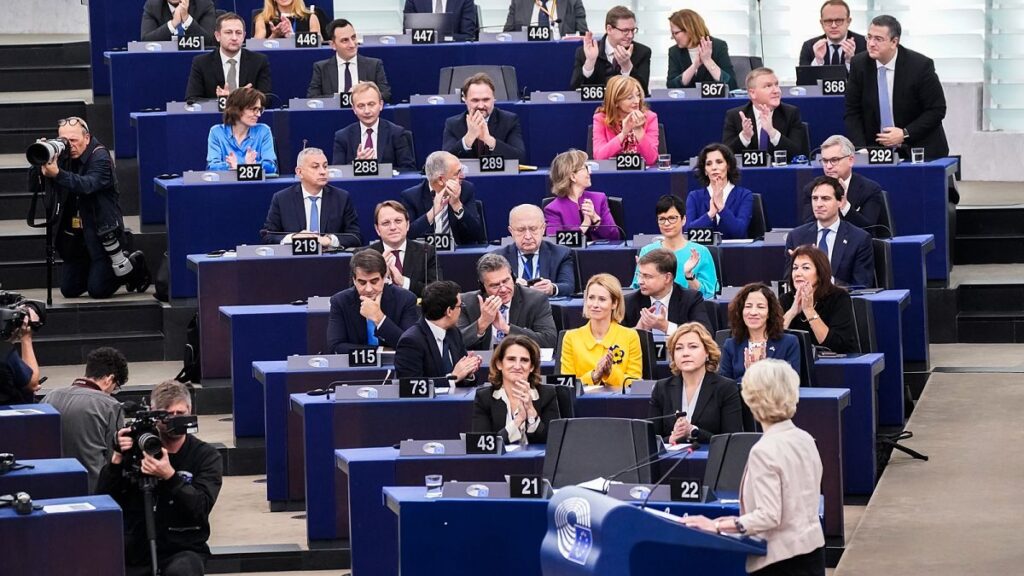A majority of Members of the European Parliament gave on Wednesday the final approval to the new European Commission of Ursula von der Leyen.
The new European Commission of Ursula von der Leyen received on Wednesday the final approval from the European Parliament, allowing the executive to take office on 1 December and kick-start the five-year legislative cycle.
The proposed Commission obtained 370 votes in favour, 282 against and 36 abstentions from lawmakers in Strasbourg, enough to pass.
In her introduction speech, von der Leyen promised a Commission head-on focused on reviving the EU’s stagnant economy, boosting competitiveness, cutting red tape, unlocking investment and closing the innovation gap with the United States and China.
Support for Ukraine, defence, migration management, enlargement, climate action, budget reform and the rule of law will also be among her team’s top priorities, set to be shaped by a right-wing shift across the bloc.
“Our fight for freedom may look different to generations past. But the stakes are just as high,” von der Leyen told lawmakers.
“These freedoms will not come for free. It will mean making difficult choices. It will mean massive investment in our security and prosperity. And above all, it will mean staying united and true to our values.”
Wednesday’s tally is noticeably smaller than the 401 votes that von der Leyen secured from the Parliament when she pitched her re-election in July, reflecting a shrinking majority backed by fewer progressives and more right-wing forces.
The change in arithmetics is likely due to the partisan squabbling that plagued the confirmation hearings of the new Commissioners.
The centre-right European People’s Party (EPP), prodded by Spain’s Partido Popular (PP), mounted a fierce campaign against Teresa Ribera (Clean, Just and Competitive Transition), framing her as responsible for the response to the Valencia flash floods.
Ribera, who until recently served in Prime Minister Pedro Sánchez’s cabinet, fought back, arguing the management of natural disasters is first and foremost the task of the regional government, which in Valencia is under the PP’s control.
Meanwhile, the Socialists & Democrats (S&D) and the liberals of Renew Europe decried the appointment of Raffaele Fitto (Cohesion and Reforms) as one of the executive vice-presidents, warning his ties with Italy’s Giorgia Meloni and the European Conservatives and Reformists group (ECR) amounted to a dangerous normalisation of far-right politics.
Socialists and Liberals also vigorously opposed Olivér Várhelyi (Health and Animal Welfare) for his close connection to Hungary’s Viktor Orbán and his long track of controversies, including an infamous episode in which Várhelyi was caught in an open mic referring to MEPs as “idiots.”
The back and forth unleashed intense days of closed-door negotiations that culminated last week in a deal to unblock all pending nominations. Ribera’s and Fitto’s portfolios remained unchanged whereas Várhelyi was stripped of his responsibilities related to reproductive rights and health preparedness.
The EPP, the S&D and Renew attempted to patch their differences with a nine-point statement to strengthen their centrist coalition. Socialists and Liberals are worried about the so-called “Venezuela majority,” which brings together the EPP with all lawmakers to its right, including those associated with Giorgia Meloni, Marine Le Pen and Viktor Orbán.
A tale of two majorities
The aftermath of these fraught negotiations was still palpable on Wednesday. The main groups were unable to guarantee internal discipline, as national delegations broke ranks and voted against the new Commission.
“We will not accept you play both sides,” Iratxe García, the leader of the Socialists, told the EPP. “It’s immoral to build Europe with those who try to suppress fundamental rights, those who deny climate change and those who backtrack on social justice.”
Valérie Hayer, the liberal leader, denounced the “Venezuela majority” for being “against Europe” and said the “only viable majority” in the Parliament was the pro-European coalition made up of the EPP, the S&D and Renew.
Both García and Hayer directly addressed Manfred Weber, the EPP leader, who many consider to be the mastermind behind the two majorities. Weber attempted to reclaim his centrist credentials and slammed Le Pen, Orbán and Alternative for Germany (AfD) as his “political enemies,” prompting booes from the far-right ranks.
“We have different ideas, we fight for our convictions but we all want to find compromises and serve all Europeans,” Weber told the Socialists and Liberals.
The Greens, who were excluded from last week’s deal despite supporting von der Leyen’s re-election in July and sharing many of her policy guidelines, were split on Wednesday, with some voting against because of Fitto’s and Várhelyi’s inclusion.
Still, the group extended an olive branch to the new Commission. “We will be both critical and constructive,” said Greens co-leader Terry Reintke.
In her speech, von der Leyen acknowledged the simmering tensions in the hemicycle and encouraged all pro-European parties to move on and work together.
“Overcoming divisions and forging compromises is the hallmark of any vivid democracy. And my message today is that we want to work with you in that spirit,” she said.
“We will work with all democratic pro-European forces in this House. And as I have done in my first mandate, I will always work from the centre. Because we all want the best for Europe – and the best for Europeans. So now is the time to come together.”
Read the full article here
